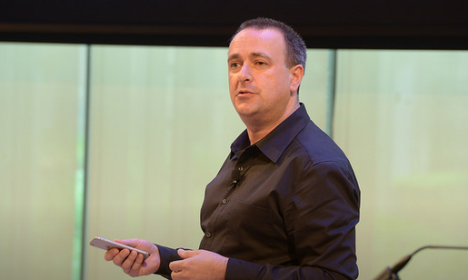Fairfax mobile boss: ‘The disruption we faced twenty years ago is happening all over again’
The head of Fairfax’s mobile operations says the publisher is refocusing its efforts in the mobile space, and is in the process of hiring more than 40 new staff in an attempt to make it truly “mobile first”.
Fairfax mobile director Stefan Savva told the International News Media Association (INMA) World Congress the company not only saw mobile as a “game changer” but said it faced a different set of competitors in the mobile space than it had in print or even desktop.
“Mobile has certainly changed how we think about competition,” Savva told the forum in New York. “The competitive landscape for Fairfax is a well written story – we have our competitors in print, our competitors in desktop – and by and large they sit in the same content platform as us.



BTW, it’s Savva, not Saava
Thanks Stevo, changed now, and apologies to Stefan.
Cheers,
Alex – editor, Mumbrella
Hey Alex. Caption is still incorrect
Thanks Stevo.
We’ve now corrected the correction.
We’re on fire today.
Cheers,
Tim – Mumbrella
Fairfax says: ….the point we need to get to is where we are platform agnostic ….
I am pretty sure I have read Buzzfeed say this – at least 2 or more years ago.
Methinks the difference between Fairfax 20 years ago and today re “disruption” was that 20 years ago the “Good Old Boys” on the board and in the senior echelons did not know they were even facing disruption. Anyone who suggested the Rivers of Gold would ever run dry was treated to a bemused self-satisfied chuckle… It was all Business as Usual, 150+ years of Good Times said they knew how to run a newspaper, and anyone who suggested otherwise was, well, deluded.
Yep.
See this is the problem isn’t it? He details how mobile changes every aspect of the publisher’s business, except the content.
But hey what has this got to do with being a publisher.
Bang on Todd.
Look at the board members today? Is there a computer scientist amongst them? The people telling the other people what to do, have no idea what to do…
Fix it: by appointing a real ‘tech head’ as the leader. Real changes will be made and hey presto Fairfax might have a serious future.
I read the SMH everyday (online). I like the balanced journalism v Murdoch’s.
Today, in 2015, the Fairfax board is still old boys!? They need to change it.
http://www.fairfaxmedia.com.au.....-directors
(Adding yet another suit, who wears funky t-shirts, ain’t gonna cut it, you need as REAL tech head, not all economists.)
you need a* REAL tech head….
Well said, Stefan. And yes, being a mobile first business is easier said than done. Easy enough to pull in the big audiences — they’re going there whether publishers like it or not. Much harder to pull in the revenue. Just as online (desktop) media blew the publishers’ revenue models apart (all those ad dollars turned into ad dimes), so mobile is blowing apart the desktop revenue model (those dimes are changing to pennies). Its hard to make a decent buck from mobile content — unless you’re Google and FB (which together account for over 60% of global mobile ad revenue) and can rely on massive volume, its going to be a hard slog.
Coming from an Advertising background it is hard to say however Content is King. Readers are attracted by content (so it needs to be strong) Advertisers follow readership (if it is a leader) and then invest their dollars. Capturing the readers then capture their interest in the advertising.
So
Good Content = more readers
More Readers = Advertisers
Advertisers = revenue
Therefore Good Content = Revenue.
Technology can be the best tools to manage ‘me” the consumer.